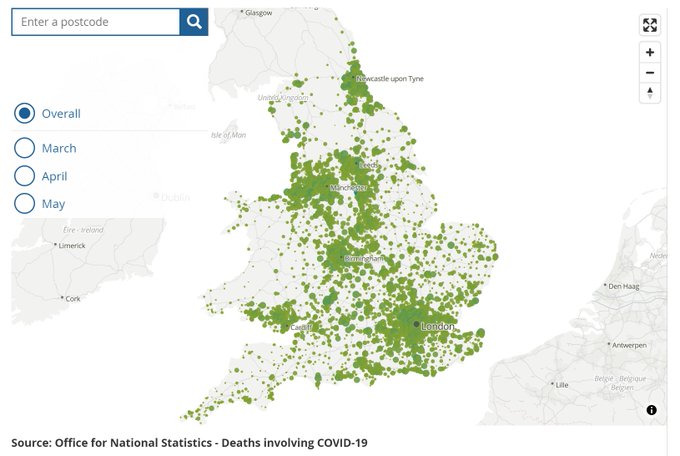The poorest in England and Wales have been hit the hardest by coronavirus. People living in the most deprived parts died of Covid-19 at double the rate of those living in the most wealthy areas according to new figures from the Office for National Statistics.
Figures from the Office of National Statistics show that the poorest 10% of England died at a rate of 128.3 per 100,000, compared to those living in the most wealthy 10% who died at a rate of 58.8 per 100,000 between March and May this year.
London had the highest age-standardised mortality rate with 137.6 deaths involving COVID-19 per 100,000 persons; this was statistically significantly higher than any other region in England and more than a third higher than the region with the next highest rate.
Nine of the ten local authorities with the highest age-standardised mortality rates for deaths involving COVID-19 over this period were London Boroughs; Brent had the highest overall age-standardised rate with 210.9 deaths per 100,000 population, followed by Newham (196.8 deaths per 100,000 population) and Hackney (182.9 deaths per 100,000 population).
Sarah Caul, Head of Mortality Analysis, Office for National Statistics
“Although London had some of the highest COVID-19 mortality rates in the country during March and April, it is now experiencing lower mortality rates compared with most areas. During May, the region with the highest age-adjusted COVID-19 mortality rate was the North East, where the rate was double that of London. The South West region continued to have the lowest mortality rate overall and during each of the last three months.
“Meanwhile, people living in more deprived areas have continued to experience COVID-19 mortality rates more than double those living in less deprived areas. General mortality rates are normally higher in more deprived areas, but COVID-19 appears to be increasing this effect.”
Dr Jennifer Dixon, Chief Executive at the Health Foundation, said:
‘COVID-19 is not a great leveller – the pandemic is having an unequal impact on our already unequal society. Today’s data show that people living in the most deprived areas of England are more than twice as likely to die as a result of COVID-19 than those in the least deprived.
‘In February 2020 the Marmot Ten Years On report identified wide and growing levels of health inequality across England, particularly between North and South. Living in socioeconomically deprived areas is associated with poor health and a shorter life and the direct effect of COVID-19 is making these inequalities worse. The wider indirect effects of the pandemic on health – for example from foregone care for other conditions, and ill health resulting from economic insecurity – are likely to have a similar but longer lasting impact.
‘As we recover from the pandemic and face considerable economic uncertainty, the Government has to get much more serious about protecting and improving the health of the population for the future. Much ill health is avoidable, and not tackling this will hamper economic recovery and attempts to level up. A cross-government strategy to improve health and reduce avoidable inequality is long overdue.’
Dave Innes, Head of Economics at the Joseph Rowntree Foundation, said:
“Before the pandemic hit there were signs that our record on tackling poverty and health inequalities was unravelling. Covid-19 has laid bare just how stark those inequalities are.
“It is completely unacceptable that someone’s life chances are so profoundly affected by where they live. Today’s statistics must act as a wake-up call – as a society with a strong sense of decency and compassion we can and must do better.
“The deep recession we are now entering is a necessary consequence of the steps taken to protect public health. The government’s furlough scheme has protected millions of jobs but it cannot be right that the poorest in our society are now bearing the brunt of the economic fallout from coronavirus too. It is vital that government takes further take bold steps to protect people from being pulled further into poverty as lockdown is lifted.”







